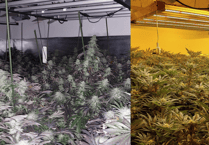On ONE of the most unpleasant Saturday mornings, weather-wise, of the year so far, some 20 hardy residents, most of whom had not had any electricity for 24 hours as a result of Storm Eunice, braved biting wind and slicing rain to go to the Selborne Recreation Ground.
Why? Because they were attending the opening of its recycling plant, and this event was all about trying to do something about climate change.
They were not only greeted with plenty of information, which had taken considerable research, but also with added ingenuity. They were soon rewarded with cups of steaming coffee and tea, and plant-based sustainable cakes as well.
Only one person confessed to coming in the hope of a hot drink, which was promised and fulfilled, and in return handed over several redundant pairs of spectacles – some broken – some sunglasses and some glasses cases, all now recyclable at the recreation ground.
Two stalwart recreation ground committee members, Sally Elborough and Polly Ravenscroft, had noticed that areas outside of the East Hampshire District Council region were recycling materials which could not be recycled in their black bins.
They painstakingly investigated the situation, particularly as to where certain items could be recycled, re-used or re-constituted, whether by local authorities, private enterprise or charities, and produced a comprehensive plan.
With approval from Selborne Parish Council, which owns the recreation ground, they bought four colourful new bins, with labels clearly explaining the intended contents, which are now lined up against the recreation ground pavilion.
These four bins can only take some specific items that are not currently recycled by East Hampshire District Council, and if people put them in the black bins it probably means that the entire contents will go in the incinerator rather than the recycling units.
This totally defeats the object of recycling and contributes greatly to the carbon emissions which are heating up the planet and threatening so many species and places.
Polly and Sally, with some new volunteers, are going to check and take the contents, which must be clean and dry, to the appropriate places to be recycled.
Items that this particular scheme can recycle include soft plastics, such as pet food pouches – which must be washed thoroughly – plastic bags and cling film, and hard plastics, such as yoghurt pots and food trays, but nothing black.
Most dental necessities can be recycled – any brand of toothpaste tube, cap and box, plastic toothbrushes, heads both manual and electric, floss containers and the Hello brand of mouthwash container.
Recycling is a comparatively new concept – although those of advancing years were all brought up post-war to ‘make do and mend’ – and it has been somewhat hampered by modern technology.
This is because new ideas and solutions are constantly being found and hard-pressed local authorities cannot afford to keep changing the very expensive equipment that can be required to deal with such a huge range of items and materials. The public has then often become confused or cynical and ignored the need for recycling.
It does require co-ordination and co-operation, but with the universal use of websites and general publicity, larger companies, schools playing a big part both by education and collection facilities, and local charities are all helping out.
The sale of food is a highly competitive market and it is very encouraging that the more responsible supermarkets are entering into this field, not least because so much of our shopping is done in such places, and produces much of our waste material, so it is worth finding out which takes what.
The East Hampshire District Council website tells people exactly what they can and cannot put in their black bins and what can be recycled at the various Hampshire County Council tips around East Hampshire.
For those places which do not have a local scheme such as that now available to Selborne, people should ask their local parish or town council if they can do something similar.
What better way is there to improve things in these very gloomy times than to have a spring clean and get so much recycled, making yourself feel happier about the clear-out. The collectors are delighted to have items being re-used, the charities are getting some funds and the planet is on its way to restoration.





Comments
This article has no comments yet. Be the first to leave a comment.